Read: Worshipping the heavenly kingdom / emperor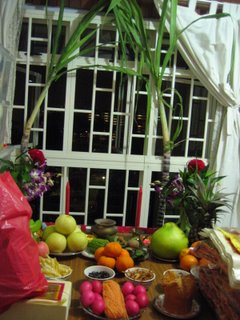
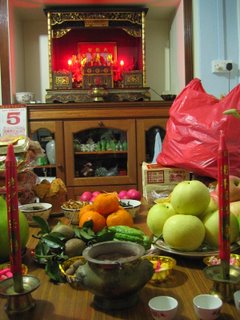
On the 9th day of the Lunar New Year, it is the day to worship the heavenly kingdom and to pay tribute to the heavenly emperor. Preparations usually begins on the night of the 8th day for my family with loads of activity and furniture rearranging in the house. At 11pm on the 8th day, the tributes are set out on a table in front of the altar, facing the window (since the sky represents the heavens). The offerings of fruits and dried stuff usually has an intricate paper-cutting forming a word (I think it means longevity?) is placed on top of each and every offering. However, this year, due to death in the family, we did not place any paper-cuttings. *whisper: in fact we're not supposed to worship at all!*
At midnight, the first minutes of the 9th day, incense is offered and we troop off downstairs to burn the "paper money" and other gold and silver made from paper to the heavens.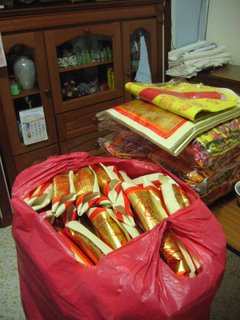
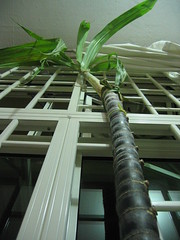
Usually there is also a pair of sugarcane that we tie to the window as pictured and as we go downstairs to burn the paper offerings, my dad will cut off the top end of the sugarcane and burn it as well.
This year, the sugarcane was black! My dad explained that this is the species that our hokkien ancestors originally grow in the fujian province.
While burning the sugarcane, I asked my mom the significance of offering the sugarcane. Previously I've only heard of banana leaf and trees being significant as they represent longeivity and eternal life as it's a plant that doesnt "die". My mom said she doesn't know. In fact, being teochew, she never heard of such practices before. My dad wasn't too sure why we do it but presumably only hokkiens do it and there are several speculations.
1) Our ancestors worked or owned sugar plantations and this is a tribute to their memory and our beginnings.
2) Since my dad only gave such a vague story about our ancestors, I decided to derive at my own speculation. When burning the sugarcane, large explosive pops were heard from the fire that sounds suspiciously like firecrackers! Turned out that sugarcane when burnt create sounds like the firecrackers and could be a reason for it being offered and burnt in worship. Loud noises are meant to scare the evil and bad away. It could also be a post-firecracker-banning practice in Singapore, to offer an alternative substitute to actual firecrackers.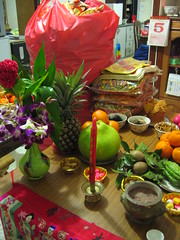
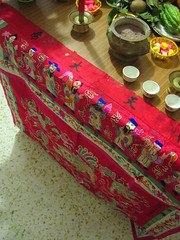
Either way, it sounds reasonable to me. Does anybody have other possible stories about sugarcanes being offered to the Ti Gong? Then again, with traditional practices and rituals being lost in our modern society, I doubt anybody would know better than my parents cept for those who are their elders.
Just today in the news, it's been reported that less families now have altars in their family and temples are seeing a 2 or 3 times increase in the number of people going to temple to offer tributes and to worship the heavenly emperor on the 9th day of the lunar new year. Usually a ritual meant to be done from night to day, people are going as and when it suits their work schedule and when the temple is open for the public - which is usually the day time. They also don't have to spend hours busying in the kitchen and preparing items as it would be simplified and provided for in the temple. But, to me, that loses all the meaning and specialness of this day... or at least, the meaning this day holds for me anyway. It's always been a rare day of activity for my family, and a good reason to stay up late.
Update: Chinatownboy wrote about pai ti gong too!!!!!!! I was going to go look up his blog to share with him my story and i had a strong feeling he will write about this very important event. Afterall, I knew him through interest in chinese diaspora taoist practices in singapore. whee! (yes i have odd and diverse interests) Note to victor: if you are reading this, scroll down and see my "human day" (ren ri) post :D
According to Chinatownboy:A pair of sugar canes was and is still a must. According to stories heard, it was said once the Hokkien were being attacked (not sure if they were the mongols or bandits) and they went to hide in the sugar cane field. The sugar cane saved their lived. And so, when they came out alive, in gratitude the prayed to Ti Kong with the sugar canes, probably reminding them of how their lives were saved.
Tuesday, February 07, 2006
Pai Ti Gong
Posted by
Monkey
at
Tuesday, February 07, 2006
![]()

 I can be contacted at
I can be contacted at 







No comments:
Post a Comment